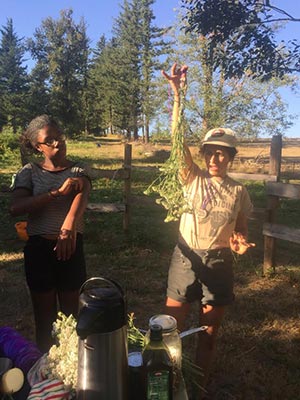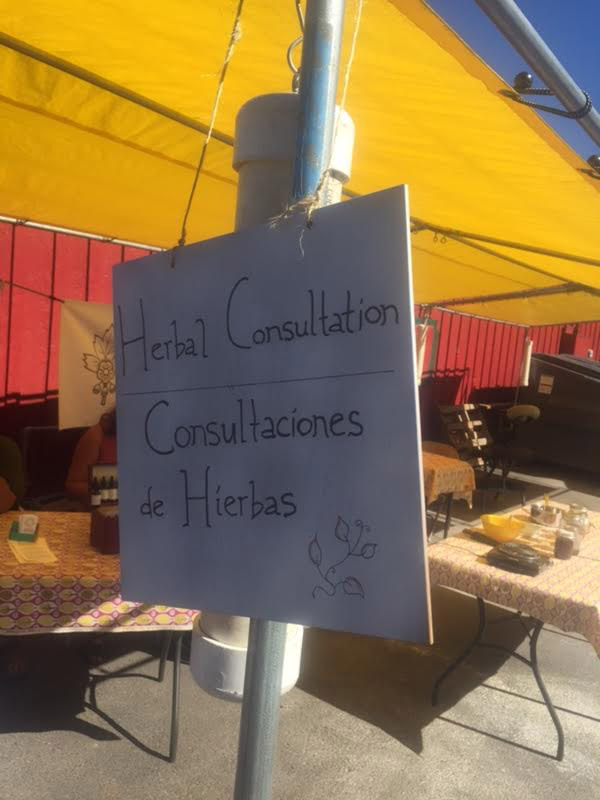Conversing with the Plants: Lara Pacheco
Welcome to the first interview in the Conversing with the Plants series. The intention of this series is to begin a dialogue about the potential for developing deep relationships with our bioregions and the plants that inhabit them while highlighting herbalists and magical practitioners who make this the focus of their work. For the first interview I spoke with Lara Pacheco. I attended herb school with Lara and have watched her work and relationship with the plants evolve over the years and was curious to know more about the ways those relationships inform her projects on the community level.
~
Casandra: How did your work with the plants begin? Was there a specific plant that you developed a relationship with? What type of training have you had along the way?
Lara: I could explore this question for hours. I think it began, really, as a child. I went to public school near the beach in Virginia. I saw that the land there was getting swallowed up by senseless development, but my school was up against an old farm. When we were supposed to be running our laps around the field, I found a place to hide out and discovered wild onion growing there. It was that early connection with the wild that caused an eruption in my consciousness with the thought that there might be food growing wild around the land. I grew up mostly around apartment complexes, the landscape covered in concrete, in a place with no gardens. Yet my heart yearned for the wild and I wanted more every time I had a brief encounter. It wasn’t until I went to college in the Shenandoah mountains that I really began to connect with nature, and through that to connect with my true self and begin my journey to adulthood.
C: You’re a talented herbalist, gardener, wildcrafter, and medicine maker. How does relating with plants inform your practice?
L: More and more every day. The more time I spend with the plants, the more I learn and receive guidance on how to respond to our ongoing cultural and environmental crisis. When I feel lost, it is usually because I have been away from or not listening to the plants. I don’t sell as much medicine but focus on medicine making for myself, my family, my friends, and the clinic I helped start that serves low-income people in my neighborhood.
 When I first started Seed and Thistle I really embraced medicine making. Over time, however, I heard a message to just be with the plants. That is why I love growing them or getting out to the woods to spend time with their wild cousins. I often don’t harvest, even in my garden when I see so many pollinators enjoying the medicinal plants I grow. That’s where I’m at right now, I just want to be with the plants. It’s also why I’ve pulled back on selling products, since overall I feel this world needs less consuming. Plants have directed my path further away from packaging them up to sell as something that can fix people’s problems and more on a journey of connecting folks to their bodies, the conversation with the land, its history and all creatures. This includes unveiling historical trauma and connecting with our ancestry.
When I first started Seed and Thistle I really embraced medicine making. Over time, however, I heard a message to just be with the plants. That is why I love growing them or getting out to the woods to spend time with their wild cousins. I often don’t harvest, even in my garden when I see so many pollinators enjoying the medicinal plants I grow. That’s where I’m at right now, I just want to be with the plants. It’s also why I’ve pulled back on selling products, since overall I feel this world needs less consuming. Plants have directed my path further away from packaging them up to sell as something that can fix people’s problems and more on a journey of connecting folks to their bodies, the conversation with the land, its history and all creatures. This includes unveiling historical trauma and connecting with our ancestry.
C: I specifically admire the work you are doing in the Cully neighborhood and with groups like Brown Girl Rise. Can you tell us about the projects you’re working on? How does developing relationships with plants inform the work you are doing to build community?
L: Plants and fungal medicine inform everything I do! They guide my work on how we as humans process colonialism, systemic oppression, and healing from historical trauma. Plants can help us in the healing process. My projects in small ways address those traumatic events. One project is with the Seasonal Wellness Clinic that works to provide access to herbal medicine, consultations, and massage to marginalized communities of Portland, OR. This year we have been specifically working in my neighborhood of Cully. We have been doing pop-up clinics this year. A part of this project is also simultaneously gathering people’s stories around some traditions and folk medicine they might have grown up around. The Cully neighborhood is full of diverse cultures from around the world. The intention in that is to 1) not assume that the people we are working to support do not also have their own knowledge of plants and healing, and 2) to celebrate and empower these traditions because our dominant culture does not.

The other project is Brown Girl Rise, which came out of conversations with someone I connected with who was a POC and had a passion to connect with their ancestry, traditions, and rituals, and to work with young femmes of color around cultivating a love and appreciation for their bodies and cycles. As a group we wanted to offer youth all the things we felt like we never experienced and reclaim some traditions that we felt like had been taken away from our ancestors. This radical sisterhood has been more medicine and inspiration to me. It is my opportunity to weave in plant medicine back into these young femmes’ lives.
C: I haven’t figured out how to frame this as a question so it’s more of a thought: I’ve begun to approach my work with the plants as an exercise in making space for their voices to come through. I feel like the (predominately white and male) magical and herbal communities have a lot to learn about listening and creating space for a diversity of voices without recontextualizing or appropriating. Do you have anything to say on the topic of cultivating sensitivity and respect – whether we are talking about sensitivity toward humans or nonhumans?
L: What a powerful question. Yes, I think this connects with my earlier comment on consumption. We’ve been trained by the dominant culture in the white patriarchal / cis-gendered / hetero-normative / linear-thinking capitalistic ways of understanding how things can serve us. This continues into this pop media health frenzy where everyone equates healthy with thin and lean and wants quick fixes from plant medicine. In this way the first question we always get asked as herbalists about a plant is “what is it good for?” It is good because it exists. We need to reframe ourselves as actors in an ecosystem that we depend on for life, and away from a role as takers who view creation as a candy store of delights. It is not enough to know the plants, even in a deep personal way. We also have to understand what role we play and how we have been shaped by an oppressive culture that victimizes people of color for profit. We need to understand how that ongoing and active victimization continues to benefit white society.
C: Lara, your work and connection with the plants is so beautiful and I love the ways you are working to support others in redefining our relationship with the plants outside of the context of colonialism and consumerism. Thank you so much for taking the time to share part of your story with us!
~
Explore more of Lara’s work:
Seed and Thistle,
Brown Girls Rise,
&
Seasonal Wellness Clinic
